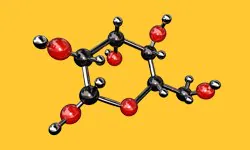Carbohydrates
Biochemicals
Carbohydrates

Carbohydrates play many important roles in living organisms. They are a key nutrients, serving as the main source of energy and are involved in various biochemical reactions related to diseases and immune responses.
Carbohydrates, also called saccharides, can be divided into four groups: monosaccharides, disaccharides, oligosaccharides and polysaccharides. Monosaccharides are made of one unit of a saccharide; one example is glucose. Disaccharides are made of two monosaccharides linked together, such as lactose. Oligosaccharides are made of 3-9 monosaccharides and polysaccharides are composed of more than 9 monosaccharides linked together, such as starch.
Glycans are monosaccharides linked together by glycosidic bonds in chain-like structures. They are present on the surface of cells and are involved in many biochemical pathways from helping cells to communicate to recognizing invading pathogens. They are diverse, complex molecules and their functions are determined by their unique structures.
Glycans are monosaccharides linked together by glycosidic bonds in chain-like structures. They are present on the surface of cells and are involved in many biochemical pathways from helping cells to communicate to recognizing invading pathogens. They are diverse, complex molecules and their functions are determined by their unique structures.
CARBOHYDRATES IN CELL CULTURE
Cells derive energy from carbohydrates, most often in the form of sugars. Sugars important in cell culture media are glucose and galactose; alternatively, some media provide energy via maltose or fructose. Media containing a higher concentration of sugars can support the growth of a wider range of cell phenotypes. Pyruvate is an important alternative source included in the formulation of some media.
GLYCOBIOLOGY PRODUCTS
Glycobiology studies the structure, biosynthesis and biological activity of simple and complex carbohydrates present in nature. Sugars are part of the outer surface of cells and are known to mediate interactions that are critical to the development and function of organisms. We offer a wide variety of products for Glycobiology research, including carbohydrates, lipids, glycoconjugates, stable isotopes and various analytical tools. Download our brochure for more information on our Glycoconjugates from GlycoNZ.


